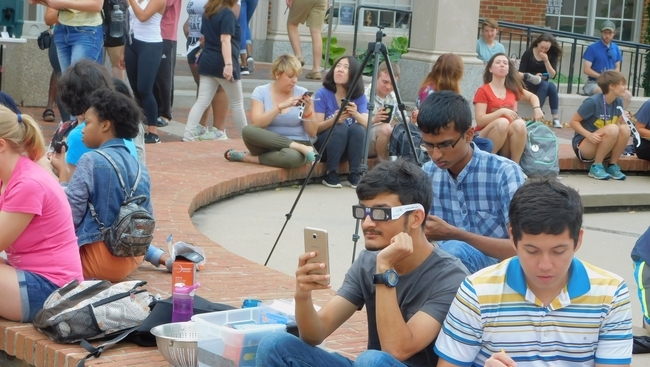
Truman State University students and Kirksville citizens gathered beneath a gray Kirksville sky at locations across campus and town to view the Great American Eclipse, even if it was only visible for a few short minutes before disappearing behind storm clouds.
Despite the obstruction of the eclipse with 98.5 percent totality that passed over town, the eclipse still encouraged the community to learn more about and pay better attention to outer space, and it brought more people to Kirksville.
The Stargazers Club and The Robison Planetarium worked in conjunction with each other, and placed solar telescopes at Moberly Area Community College, Adair County Public Library, Kirksville elementary school, and on Truman’s campus at The Mall while also opening the observatory at the University Farm for public use to enhance the view of the eclipse. While these telescopes quickly had to be removed as inclimate weather approached, the planetarium was still able to use their facility to run eclipse simulations. They went forward and backward in time as well as changed location to different towns in the path of totality. The planetarium also livestreamed videos of NASA’s nationwide eclipse coverage. NASA had continuous coverage of the event from start to finish.
All of these activities made planetarium a “one stop shop for eclipse viewing,” Planetarium Director Jared Young said.
Young, who has been working for the planetarium since 2014, said he hopes the eclipse will motivate members of Truman and Kirksville communities to have a continued interest in space and what the Stargazers Club and the planetarium are doing.
Young said the eclipse caught the attention of many people across the country because of its rarity.
“It’s a change in the day, and that in itself is exciting,” Young said. “It’s not every day that the sun gets blocked out by another celestial object. When you think about what it takes to make a solar eclipse, this is huge … it’s something to be witnessed, something to be seen, something to take note of— grand scheme of things— it’s an event, but it’s an exciting event. It’s something that happens in nature, and it just so happens it’s pretty neat to look at.”
Stargazers Club President junior Tatsu Akiba said an eclipse is an event everyone can appreciate and not just those invested in astronomy or physics because it is a way to view the sun in a way most people are not used to.
“I think non-astronomy people would still be able to appreciate just how pretty the eclipse is,” Akiba said. It’s a humbling experience, and I think you learn to appreciate nature a little bit more and just everything that’s happening on Earth and everything that lives on Earth.”
In addition to teaching the community more about space, the eclipse also served as a way to boost the Kirksville economy.
Even though Kirksville was not in the line of totality for the eclipse, Kirksville Tourism Director Debi Boughton said the eclipse created a great opportunity to advertise in Iowa, Illinois and Wisconsin. Boughton said she did this to cater to people in those states passing through Kirksville to get to places with full totality like Columbia, St. Louis or Kansas City or to those wanting to view 98.5 percent totality in Kirksville rather than the minimum totality they’d experience in their home towns.
Boughton said all hotel rooms in Kirksville were booked for the night of Aug. 21, and she said her hope was a lot of people driving back north after the eclipse would pass through Kirksville around dinner time and stop to eat.
“I hope as tourism director to have people who want to stay all night here in our hotels,” Boughton said. “Hopefully they’ll stop at our restaurants and spend some money here in town and buy some gasoline on their way back north, so it will be a good economic benefit too. Every time we have an event here, it’s a good opportunity to put Kirksville on the map.”
In addition to the traction the eclipse brought to Kirksville, one conflict rose when it became clear the eclipse was going to happen on the first day of classes for Truman students.
Janet Gooch, Executive vice president for academic affairs and provost, said Truman administration considered cancelling the first day of classes. Truman administration decided to continue the first day of classes as scheduled because if they didn’t, it would create a scheduling conflict and could result in students having to go to class an extra day, Gooch said.
Despite not canceling classes, Gooch said Truman administration encouraged professors to show flexibility toward students wanting to view the eclipse and sent out an email listing ways professors could incorporate the eclipse into their classes if they did not want to cancel class.
“Truman’s motivation was to provide some opportunities for our students on campus while providing some flexibility for students that would want to go see the eclipse in the path of totality,” Gooch said. “We did consider cancelling class, but we wanted to provide some learning opportunities for our own students who were here.”
The next solar eclipses expected to pass through the Kirksville area will include an eclipse in October 2023 with about 50 percent totality and an eclipse in April 2024 with about 90 percent totality, according to timeanddate.com and confirmed by Physics and Astronomy Professor Vayujeet Gokhale. While Kirksville spectators may have been unsuccessful in viewing the most recent eclipse, in another six or seven years Kirksville spectators will have another chance to see a partial or total eclipse.
